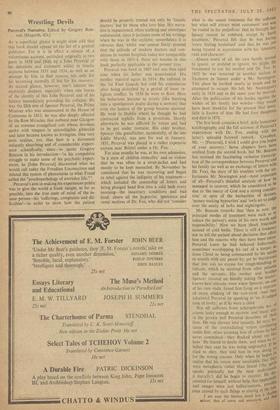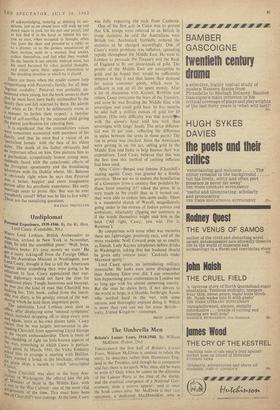Wrestling Devils
Perceval's Narrative. Edited by Gregory Bate- son. (Hogarth, 42s.)
At A superficial glance it might seem odd that this book should appear on the list of a general publisher. For it is in effect a reissue of a voluminous account, published originally in two parts in 1838 and 1840, by a John Perceval of his delusions and treatment whilst in lunatic asylums between 1831 and 1834, as well as an attempt by him to find reasons not only for his becoming mentally ill but for his recovery. At second glance, however, one's interest im- mediately deepens, especially when one learns of the identity of this John Perceval and of his history immediately preceding his collapse. He was the fifth son of Spencer Perceval, the Prime Minister who was assassinated in the House of Commons in 1812, he was also deeply affected by the Row Miracles, that outburst near Glasgow of an extreme evangelical cult whose devotees spoke with tongues in unintelligible gibberish and later became known as Irvingites. One very soon realises, too, that here is a document uniquely absorbing and of considerable import- ance scientifically, since—to quote Gregory Bateson in his introduction--'in his compulsive struggle to make sense of his psychotic experi- ences, he [John Perceval] discovered what we would call today the Freudian Unconscious and related this system of phenomena to what Freud called the "pyschopathology of everyday life."'
Perceval's aim in making his experiences public was to give the world a frank insight, as far as possible, into the true state of mind of the in- sane person—his 'sufferings, complaints and dif- ficulties'—in order to show how the patient should be properly treated not only by 'lunatic doctors' but by those who love him. His narra- tive is impassioned, often scathing and sometimes unbalanced, since it includes some of his writings when he was in the asylums; nevertheless it is obvious that, whilst one cannot fairly pretend that the attitude of modern doctors and con- ditions in mental hospitals today are comparable with those in 1831-4, there are lessons in this book perfectly applicable at the present time Perceval was born in 1803 and was thus aged nine when his father was assassinated. His mother married again in 1814 He enlisted in the 1st Foot Guards but sold his commission after being disturbed by a period of inner re- ligious conflict. In 1830 he went to Row. Here his behaviour became so erratic (like bursting into a spontaneous psalm during a sermon) that even the leaders of the group became alarmed. He went to Dublin where he thought he had contracted syphilis from a prostitute. Shortly afterwards he was afflicted by voices and had to be put under restraint. His elder brother, Spencer (the grandfather, incidentally, of the late Eddie Marsh), was sent for and in January, 1831, Perceval was placed in a rather expensive asylum near Bristol under a Dr. Fox.
For nine months he was, at his own admission, `in a state of childish imbecility' and so violent that he was often in a strait-jacket and had mostly to be kept manacled. By November he considered that he was recovering and began to rebel against the indignity of his treatment— which included the censorship of letters and being plunged head first into a cold bath every morning—the insanitary conditions and bad food: above all the hypocrisy, ignorance and venal motives of Dr. Fox, who did not 'consider
THE SPECTATOR, JULY 20, 1962 what is the sanest treatment for the sufferers but what will attract most customers' and WaS `so rooted in his prejudices' that he thought that lunacy cannot be subdued, except by harsh treatment.' Perceval felt that he was having `every feeling brutalised' and that he was not being treated in accordance with his 'situation, rank and character.' Almost worst of all, his own family seemed to ignore, or pretend to ignore, his plight. He threatened to sue his mother and Dr. Fox. 10 1832 he was removed to another asylum at Ticehurst in Sussex under a Mr. Newington. This place he loathed nearly as much and he attempted to escape. He left Mr. Newington's early in 1834 and in the same year he married. After the publication of his books, against the wishes of his family (no wonder—they would have been thankful for the present libel laws)' gbterS little is known of him. He had four dau
and died in 1876.
The first hook contains a brief, drily humorous autobiography and the full account of Perceval's experiences with Dr. Fox, ending with the latter's splendid farewell remark : `Goodbye, Mr. — [Perceval], I wish I could give you hopes of your recovery.' Some chapters have been omitted from the second book, but Mr. Bateson has retained the fascinating verbatim transcriP" tion of the correspondence between Perceval and his family (as well as an exchange of letters with Dr. Fox), the story of his troubles with the un- fortunate Mr. Newington and—most important of all—Perceval's detailed analysis of how he managed to recover, which he considered to he due to 'the mercy of God and a strong constitu- tion' in spite of the barbarities of doctors, `money-making hypocrites' and 'owls set to judge over the sanity of larks and nightingales.' Mr. Bateson remarks that 'then as now, the principal modes of treatment were such as to reduce the patient's sense of his own worth and responsibility.' Now we have shock treatment instead of cold baths. There is still a tendency not to tell the patient about decisions that affect him and the reasons why they have been taken. Perceval knew he had behaved ludicrously" sometimes worshipping his oaf of a keeper Jesus Christ or being commanded by his spirits, to wrestle with any passer-by, yet he maintainen that this was no excuse for rough-handling or ridicule, which he received from other patients and the servants. His mother and brother Spencer insisted on blindly taking the doctor- knows-best attitude, even when Spencer, on one of his rare visits, found him lying on a mattress of straw stinking of the cow-yard. And they infuriated Perceval by speaking in 'an ill-judged tone of levity,' as if he were a child. Not all sufferers from schizophrenia arc of course lucky enough to recover, and many' stay _ in the private hell Perceval describes all their lives. He was thrown into insanity, he says, be- cause of the contradicting voices combating inside him, often accusing him of crimes he had never committed--`they flocked about me 111' bees.' He feared to doubt them, and when he rt.!: belled they said he was being ungrateful. if he
tried to obey, they told him he was
for the wrong reasons. Only when he began y realise that his voices were unreliable, that they were metaphoric rather than literal (-the sPli„ speaks poetically but the man understands_ it literally'), did he begin to recover. He cloy doing so covered for himself, without help, that aPParel.loy real images were just hallucinations, Pnssi even caused by such things as staring at the sun" I am sure the human mind has a d'11,0 bie action; that of sense and sensation, and n'
of acknowledging, noticing or defining its sen- sations, just as an absent man will walk up and down stairs to took for his pen and pencil, and at last find it in his hand or behind his ear; just as men, when occupied in thought, often rise from the chair and proceed to a table, or to a drawer, or to the garden, unconscious of their motion, until in a mariner they awake, collect themselves, and feel what they wanted. So the lunatic is not entirely without sense, but his mind harassed by other painful thoughts, and intent upon them, appears insensitive to the shocking situation m which he is placed.
There are times when the reader cannot help sympathising with Perceval's family, for all their `bigoted credulity.' Perceval was probably un- balanced when young, but the book seems to show that he must have been badly mishandled by the family then and felt rejected by. them. He admits that while at Dr. Fox's he deliberately wrote in a manner `to forfeit their respect,' a familiar kind of self-sacrifice by the rejected child giving the parent justification for rejecting him. It is significant that the contradictory voices were sometimes associated with members of his family, and that he once shad a vision of an unclothed female' with the face of his eldest sister. The death of hiS father obviously had an important effect on him. One pictures him as a Puritanical, scrupulously honest young man, suddenly faced with the cataclysmic effects of the Irvingites' spontaneity and the humiliating adventure with the Dublin whore. Mr. Bateson Is obviously right when he says that Perceval was a better, happier and more imaginative Person after his psychotic experience. His early Marriage seem to prove this. But was he ever
These cured? What was he like to live with? 'hese are the tantalising questions.
RALEIGH TREVELYAN



































 Previous page
Previous page